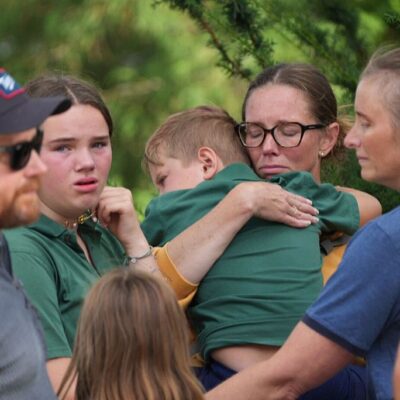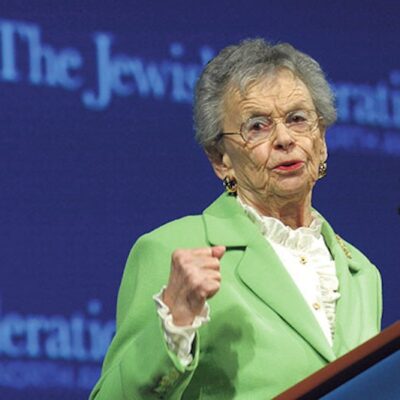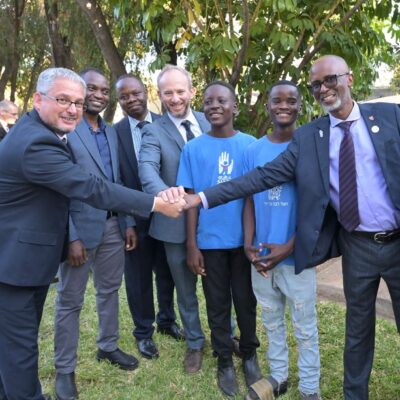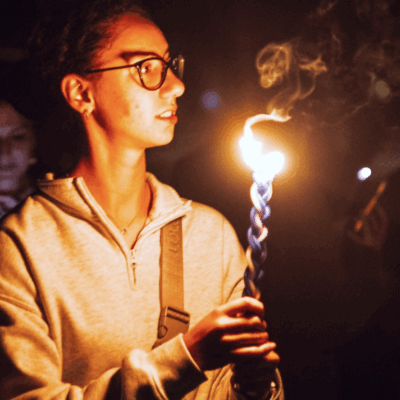Opinion
Shamor L'Amour
Shalom bayit, baked into the Shabbat meal
By Rav Sean Gorman
Jewish Women International’s Clergy Task Force to End Domestic Abuse in the Jewish Community has just released its 2021 “Shamor L’Amour – A Healthy Relationship Shabbat.” This annual program is designed to spark conversations about healthy relationships by clergy, among couples, families, singles, and in our varied communities. These conversations can be held anywhere – from the pulpit to the dinner table; while taking a walk, or over your favorite conferencing website.

Courtesy JWI
Shamor L’Amour takes place in February because of Valentine’s Day. While by no means a Jewish holiday, we see Valentine’s Day everywhere. Both in stores and online, February has become the month when relationships are defined by the size of the box of chocolate.
We affirm that chocolate is an essential part of life. However, when we, your rabbis and cantors, talk and sing about healthy relationships, we go beyond Valentine’s Day. We go beyond one day a year. We change the context of the conversation from relationships to Jewish relationships, from flowers on February 14th to flowers on every Shabbat.
Jewish tradition is replete with statements about relationships. From the earliest pages of the Torah, we are told lo tov heyot ha’adam l’vado – it is not good for a person to be alone. We understand this to be a grand statement about the importance of relationships. Within that grand statement, we remember also that Jewish law and tradition emphasize the preservation of physical and psychological health.
Shamor L’Amour looks at healthy relationships through the lens of the different parshiyot, the different Torah portions from the month of February. It is not just the grand statement from earliest words of the Torah. The Torah continues to teach at every turn. From Parashat Yitro (February 6), Yitro, Moshe’s father-in-law, advises Moshe on when to seek assistance. We learn that just as Moshe could not do it all alone, we cannot either. Sometimes, we need help.
The special aliyah with Parashat Mishpatim (February 13) this year is Shekalim. We are reminded that a crucial verb in that aliyah is v’natnu – and they shall give. The transliteration robs us of the palindrome, of the word that is spelled and read the same in both directions. The implication is important. Giving must be both ways, or relationships become unhealthy.
From Parashat Terumah (February 20), we learn that the shulchan, the table for the Mishkan that accompanied the Children of Israel through the desert, is made from wood, a material that grows and changes. We learn also that the menorah in the sanctuary is made from gold, a metal, a material that will not change once the goldsmith is done. Healthy relationships find the balance between that which grows and changes and that which remains steadfast.
From Shabbat Zakhor leading into Purim (February 26), we learn about remembering and forgetting, about holding fast and letting go. We remember what has happened to us as a people, and to many people in their relationships. We also learn to forget, to be able to walk away from the traumas of unhealthy relationships.
As we begin the month of February, we pause to take stock of our relationships. What has been healthy? What has not? When do we need help? Do we give on equal terms? Are we too firm or too flexible as we grow? Do we remember what might have happened even as we learn to let go of trauma?
Oh, and if you like Valentine’s Day, we urge all Jews, young and old, Boomer and Millennial, to remember Tu B’Av, the 15th of the month of Av (July 24 this year). This is Jewish tradition’s day for romance and love, and has been around far longer than Valentine’s. We also mention that every Shabbat is appropriate for flowers and chocolate. Come to think of it, so is every other day. Every day is appropriate for those little reminders of love and romance in a couple. Find your healthy spot and dwell there.
Just as Shabbat gives us the time to honor our relationships, the conversations created by the resources provided in Shamor L’Amour encourage us to think about personal, intimate relationships. To that end, we are delighted to present this year’s program material. It is easily available at Shamor L’Amour. There you will find sermonettes, conversation cards, questions for discussion, and points to ponder.
As always, we hope and pray for peace in our own lives, as well as in yours.
Rav Sean Gorman of Toronto, Canada is a member of JWI’s Clergy Task Force to End Domestic Abuse in the Jewish Community and a Reservist in the United States Navy. The CTF is a multi-denominational group of clergy who write and create resources for clergy to address domestic abuse. To learn more about the CTF, go to www.jwi.org/clergy.














